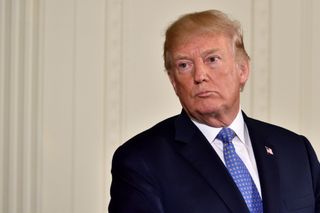Huawei placed on trade blacklist by US gov
Department of Commerce wants to prohibit deals that pose an "unacceptable risk" to national security

The US Department of Commerce has placed Huawei and its affiliates on a trade blacklist to ban it from acquiring American components and technology without government approval.
It follows President Donald Trump's declaration of a national emergency over threats against information and communications technology in the US, which prompted the signing of an executive order barring all US firms from striking telecoms deals with companies deemed to be a risk to national security.
"President Donald J. Trump signed an Executive Order entitled 'Securing the Information and Communications Technology and Services Supply Chain' as part of his commitment to protecting the information and communications technology and services of our Nation," a White House statement said.
"The President has made it clear that this Administration will do what it takes to keep America safe and prosperous and to protect America from foreign adversaries who are actively and increasingly creating and exploiting vulnerabilities in information and communications technology infrastructure and services in the United States."
Wednesday's Executive Order declared a "national emergency" delegating authority to the Secretary of Commerce to prohibit transactions posing an "unacceptable risk" to US national security or the security of its citizens. Although the order did not specifically target any country or company, the Commerce Department then took specific aim at Huawei, announcing it had placed the company, and 70 of its affiliates, on a so-called "Entity List" of firms deemed a risk to national security, according to The New York Times.
"This will prevent American technology from being used by foreign-owned entities in ways that potentially undermine US national security or foreign policy interests," commerce secretary, Wilbur Ross said in a statement.
The move adds a further strain to the US-China trade dispute, ahead of a planned visit to China by treasury secretary Steven Mnuchin. The US government has attempted to convince its allies that Huawei's telecoms infrastructure poses a security risk and, in turn, the firm has worked to quash these accusations.
Get the ITPro. daily newsletter
Receive our latest news, industry updates, featured resources and more. Sign up today to receive our FREE report on AI cyber crime & security - newly updated for 2024.
Similar to its discussions with the UK, Huawei said it was "ready and willing" to engage with the US government and come up with effective measures to ensure product security.
"Restricting Huawei from doing business in the US will not make the US more secure or stronger," a Huawei spokesperson said. "Instead, this will only serve to limit the US to inferior yet more expensive alternatives, leaving the US lagging behind in 5G deployment, and eventually harming the interests of US companies and consumers. In addition, unreasonable restrictions will infringe upon Huawei's rights and raise other serious legal issues."
The US decision coincided with the release of a report by the Henry Jackson Society, a UK neoconservative think tank, which has called for the government to block Huawei's participation in the UK's 5G network. The report, which featured a foreword from former chief of MI6, Sir Richard Dearlove, said the use of Huawei was a risk "we simply do not need to take".
Huawei's response to the report is perhaps its toughest to date, saying the report was "long on politically motivated insinuation but short on fact", adding that it "fundamentally misunderstands the nature of modern China, global technology markets and of 5G".
"We are an independent, employee-owned company which does not take instructions from the Chinese government," a spokesperson added. "In 32 years, there have been no significant cyber security issues with our equipment. We hope and expect that any decision on Huawei's participation in Britain's build-out of 5G networks will be based on solid evidence, rather than on unfounded speculation and groundless accusations."
Bobby Hellard is ITPro's Reviews Editor and has worked on CloudPro and ChannelPro since 2018. In his time at ITPro, Bobby has covered stories for all the major technology companies, such as Apple, Microsoft, Amazon and Facebook, and regularly attends industry-leading events such as AWS Re:Invent and Google Cloud Next.
Bobby mainly covers hardware reviews, but you will also recognize him as the face of many of our video reviews of laptops and smartphones.





